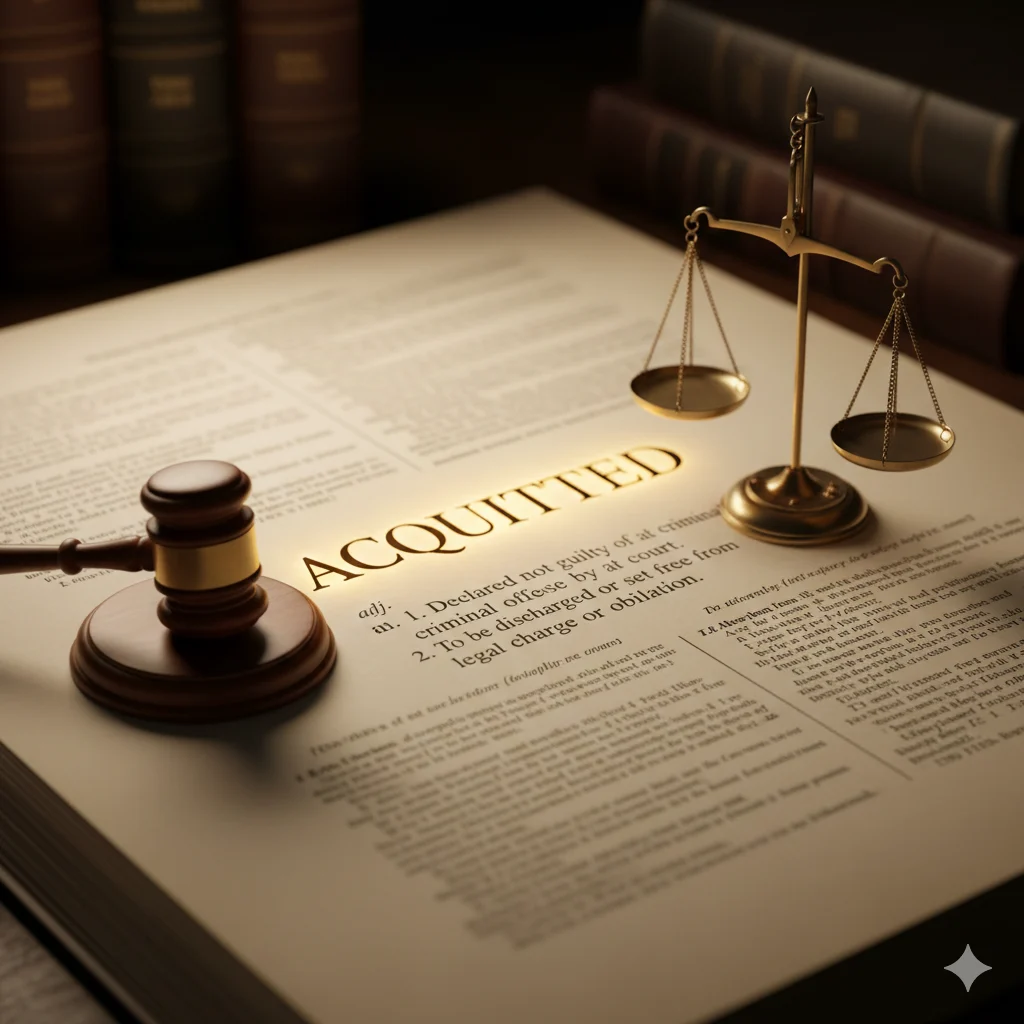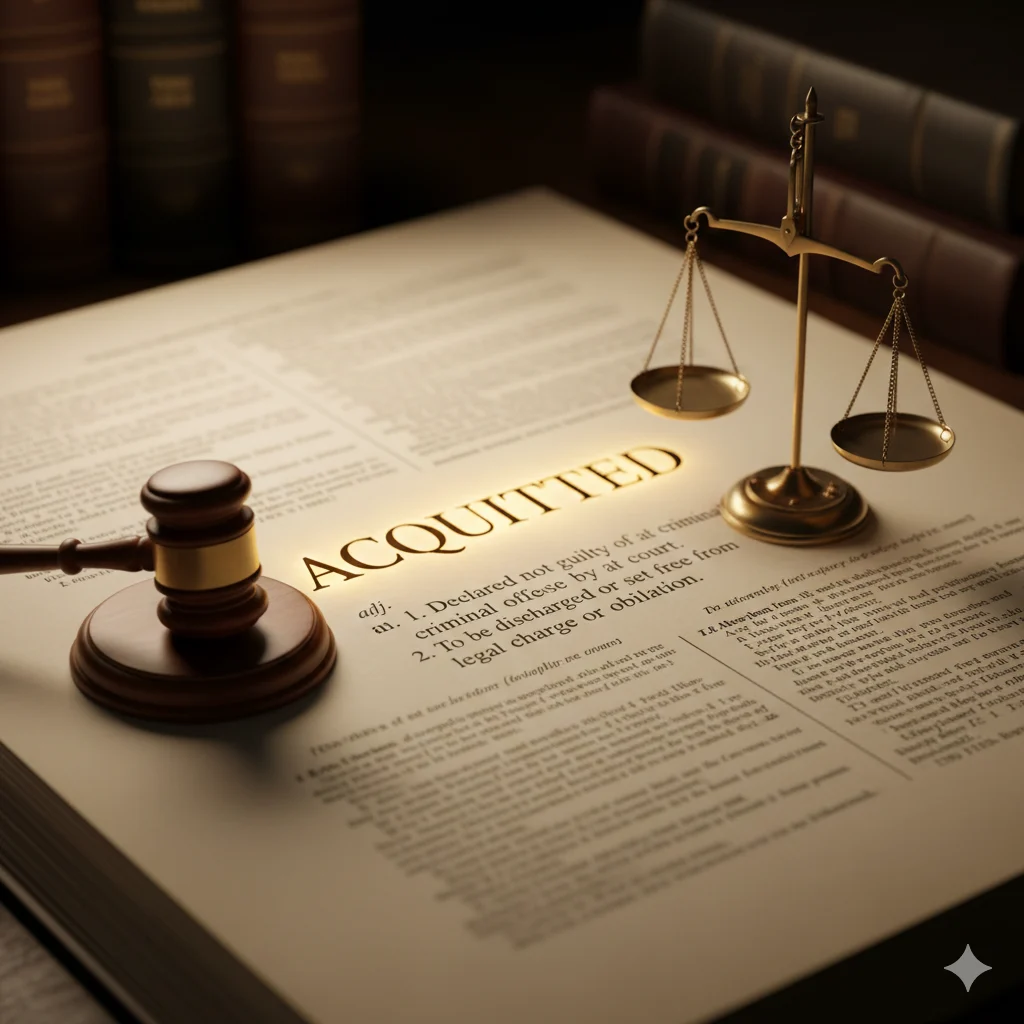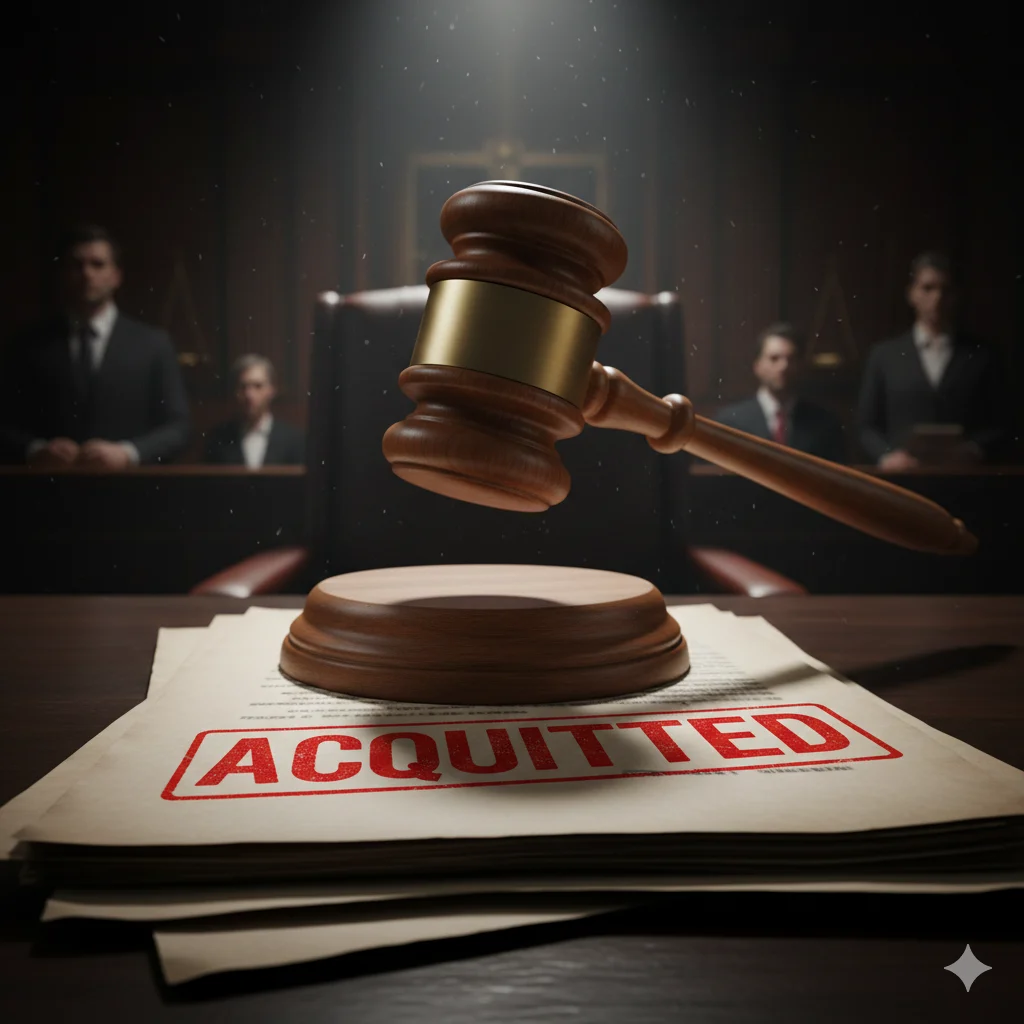“Acquitted” means a person has been found not guilty in court.
If someone is acquitted, it means the legal system has cleared them of the criminal charges and they are officially free of blame for that specific case.
The term is deeply connected to criminal law, court trials, verdicts, and the justice system. While people often hear “acquitted” in movies or news reports, many don’t fully understand what it really means, how it happens, or how it differs from related terms like dismissed, exonerated, or not guilty.
This article breaks down the full meaning of “acquitted,” why it matters, how courts use it, real examples, and common misunderstandings.
Meaning and Legal Definition of Acquitted
Basic Meaning of Acquitted
In simple terms:
- Acquitted = Not guilty
- Acquitted = Cleared of criminal charges
- Acquitted = Legally innocent for that case
When a judge or jury says a defendant is “acquitted,” it means:
- the prosecution could not prove the case
- the defendant is free from the accusations
- no criminal punishment will occur
Acquittal in Legal Terms
In a court of law, an acquittal is a formal judgment that:
- the evidence is not enough
- the defendant is legally not responsible for the crime
It is the opposite of a conviction.

Difference Between “Acquitted” and “Not Guilty”
Not Guilty Is the Verdict
“Not guilty” is the verdict delivered by the judge or jury.
Acquitted Is the Final Legal Status
“Acquitted” describes the legal outcome:
- The person is free
- The case against them is over
- They cannot be punished for that specific crime
So:
- Verdict: Not Guilty
- Outcome: Acquitted

Types of Acquittals
Full Acquittal
A full acquittal means the defendant is cleared of all charges.
They walk out of court completely free regarding that case.
Partial Acquittal
A partial acquittal means:
- some charges are dropped
- some charges remain
For example, someone might be acquitted of robbery but still face sentencing for resisting arrest.

How Does an Acquittal Happen?
Through a Jury Trial
A jury evaluates evidence, testimonies, and arguments.
If they vote “not guilty,” the defendant is acquitted.
Through a Bench Trial
If there is no jury and the judge alone decides the case:
- the judge can acquit the defendant directly
When Evidence Is Insufficient
If prosecutors cannot provide enough evidence, the judge may order an early acquittal.
After Defense Motions
A defense lawyer can file motions such as:
- motion for acquittal
- motion to dismiss for lack of evidence
If granted, the defendant is acquitted without the jury deciding.
What an Acquittal Does Not Mean
Many people misunderstand this.
An acquittal does not always mean:
- the defendant is innocent
- the defendant did not do the act
- the judge believes the defendant is truthful
What it means is:
- the prosecution did not prove guilt “beyond a reasonable doubt”
This is the highest standard in the legal system.
Acquitted vs. Dismissed vs. Exonerated
Acquitted vs. Dismissed
Acquitted
- Case goes to trial
- Verdict = Not guilty
- Defendant is cleared after evidence is reviewed
Dismissed
- Case is thrown out before trial
- No verdict is given
- Not the same as proving innocence
Acquitted vs. Exonerated
Acquitted means the defendant was not proven guilty.
Exonerated means the defendant is proven innocent often after conviction.
Example of exoneration:
DNA tests or new evidence clears a previously convicted person.
Acquitted vs. Pardoned
- A pardon is mercy granted by a president or governor.
- An acquittal is a legal judgment of not guilty.
They are not the same.
Practical Examples of Acquittal
Example 1: Self-Defense
A person charged with assault proves they acted in self-defense.
They are acquitted because the prosecution cannot prove criminal intent.
Example 2: Lack of Evidence
Someone accused of theft has no fingerprints, no witnesses, and no video.
The jury cannot convict them.
They are acquitted.
Example 3: When Witnesses Change Their Stories
If witnesses contradict themselves, the case becomes weak.
The defendant may be acquitted due to unreliable evidence.
Example 4: High-Profile Cases
In celebrity trials, juries often acquit because evidence is not strong enough—even if public opinion believes otherwise.
Reasons Courts Acquit Defendants
Weak or Insufficient Evidence
If prosecutors cannot build a strong case, the defendant must be acquitted.
Witness Credibility Problems
If witnesses lie, change statements, or cannot be trusted.
Illegal Evidence
If police did not follow legal procedure, evidence may be excluded.
Without evidence, the case falls apart.
Reasonable Doubt
If the jury has any reasonable doubt, legally they must acquit.
Strong Defense Strategy
Skilled attorneys can expose flaws in the prosecution’s case.
What Happens After an Acquittal?
The Defendant Walks Free
They face:
- no jail
- no fines
- no criminal penalty for that charge
The Case Cannot Be Retried (Double Jeopardy)
A person cannot be tried twice for the same crime after acquittal.
This is known as double jeopardy protection.
The Criminal Record
An acquittal does not erase the record of the arrest or trial.
However, the defendant can request:
- record sealing
- expungement
- removal from background checks
Why People Confuse Acquittal With Innocence
The Legal System Focuses on Proof
In law, “not guilty” does not equal “innocent.”
It means:
- the government failed to prove guilt
- the defendant cannot be punished legally
A jury or judge does not declare someone innocent; they declare the charges unproven.
Media Influence
News outlets often simplify the language:
- “He got away with it.”
- “She was proven innocent.”
But legally, that is not the correct interpretation.
How Acquittals Shape Public Opinion
High-Profile Acquittals
In major trials, public reaction may differ from the legal outcome.
People may:
- question the justice system
- debate fairness
- form emotional judgments
Wrongful Accusations and Reputation
Even after an acquittal, some people still face:
- stigma
- judgment
- rumors
- damaged reputation
This is why legal experts emphasize the need to understand what an acquittal truly means.
Social Media and the Word “Acquitted”
Modern Usage Online
People use “acquitted” in memes, jokes, TikTok videos, and Twitter threads.
Example:
- “I ate the last slice but I acquitted myself in court.”
- “My mom accused me of breaking her vase. I demand acquittal.”
This humorous usage makes the term more accessible to younger generations.
Conclusion
Acquitted means the defendant has been found not guilty in court and is legally cleared of the charges. An acquittal ends the case completely and prevents retrial due to double jeopardy laws. It does not always mean the person is innocent—it simply means the prosecution did not prove guilt beyond a reasonable doubt. Understanding the true meaning of acquitted helps people interpret news reports, legal discussions, and real-life cases more accurately.

Hi, I’m Shaun Tait, the voice behind Rizztak.com. I love diving into all things fun, quirky, and shareable—whether it’s clever life hacks, hilarious memes, or the latest trends online. My goal here is simple: make you laugh, think, and maybe even discover something new you didn’t know you needed.




